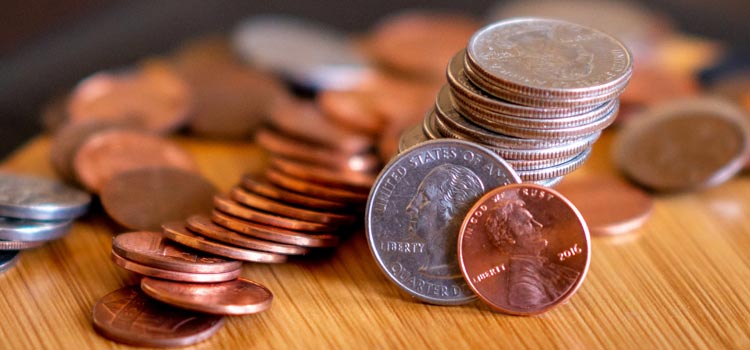While there are many payment options these days from credit and debit to online payments, and even cashier-less shopping (Hello, Amazon Go!), you can’t really avoid racking up pennies, nickels, dimes and quarters here and there.
If you found out your piggy bank is full and looking for a way to exchange coins to cash, here are several tried-and-tested ways that are FREE or low-cost.
4 Ways to Exchange Your Coins to Cash
1. Exchange Coins to Cash at Banks
If you haven’t gone to your local bank and tried exchanging coins for bills before, there’s a good chance you’ll be disappointed. Here’s why:
- Not all banks accept coins.
- Some banks accept coins for customers and non-customers (but charge non-customers a fee)
- If a bank accepts coins, it’s highly likely there’s a fee to have your coins exchanged for bills.
- Some banks will accept your coins ONLY if they are rolled.
- Other banks will only exchange your coins if you’re depositing them into your account.
If you’re planning to go to the bank with a kid and his/her piggybank with you, make sure to check with your bank if they’re accepting coins first. It can be disappointing for kids to learn that they saved up for months only to be shooed away by our trusted banks.
Some banks OFFER REWARDS though. They’re rare, but it happens. Just like Wisconsin-based Community State Bank’s “Coin Buy Back” program in 2020, where they rewarded $5 for every $100 worth of coins exchanged.
So which banks accept coins, then? Here are some banks that are known to exchange coins:
- Bank of America (roll your coins first)
- Capital One (roll your coins first)
- Chase (roll your coins first)
- Citibank (roll your coins first; prepare to pay fees)
- Community Savings Banks (requirements vary)
- First County Bank
- Peoples United
- US Bank (accept only for current customers)
- Wells Fargo (allows non-customers, but coins should be rolled)
- Western Credit Union
There may be others more, especially at community banks and credit unions, but it’s hard to say… since every bank has its own coin acceptance policy.
- PROS of Exchanging Coins to Cash at Banks: Convenient, can be deposited into your account.
- CONS of Exchanging Coins to Cash at Banks: Some banks do not accept coins. Varying policies can be frustrating.
Call your bank before bringing the coins with you to be 100% sure, especially if they’re too heavy to be lugging around from one bank to the next. Ask the bank if:
- Do they accept customers or non-customers exchanging coins for cash?
- If they accept coins, should they be rolled or not?
- Are the coin wrappers are free or do you need to purchase roll papers first?
- What fees do you need to pay?
2. QuikTrip
QuickTrip is a chain of gas stations and convenience stores you can find across 11 states and at over 800 locations. QuikTrip welcomes anyone who wishes to trade coins for cash. The service is FREE, too!
If you live near a QuikTrip location, you can even bring your piggy banks there and QuikTrip employees will handle the counting for you. They appreciate rolled coins, but for now, it isn’t a requirement.
In instances where the QuikTrip location doesn’t have enough cash to turn your coins into bills, you can receive a QuikTrip gift card if you’re fine with it.
- PROS of QuikTrip: The service is free. No need to roll coins.
- CONS of QuikTrip: Not everyone has a QuikTrip near them. Plus, there’s a possibility that the QuikTrip location won’t have enough cash available to exchange your coins.
Is there a QuikTrip near you? Check here.
3. Coin-Counting Machine Coinstar (Paid and Free Methods)
If you don’t have a local bank with a coin exchange program or QuikTrip location near you, your next best bet is a Coinstar kiosk.
These Coinstar machines are found in major grocery stores and drug stores. You can find a Coinstar kiosk near you here, but they’re mostly located in CVS, Safeway, Walmart, and Fred Meyer.
So how does Coinstar work?
First, you drop your coins into the coin-counter machine. Wait for the machine to count each of your coins. Sometimes, it even rejects a coin if the machine cannot identify the currency.
Once the machine finishes counting the coins, you are given three choices:
- Get paid with cash (but with an 11.9% fee deducted from the total)
- Receive a gift card to certain stores (see the list below)
- Donate to a charity of your choice.
If you select cash, you’ll receive a printed receipt from the machine, which you’ll take to the customer service counter. Here, you’ll be paid in cash. Coinstar pays the store eventually for this transaction.
- PROS of Coinstar: Super accessible, no need to count coins manually, and always ready to exchange coins for cash.
- CONS of Coinstar: Unfortunately, this convenience isn’t free. Coinstar charges an 11.9% service fee. So if your grandma left you a $5000 inheritance in several piggybanks, that fee is a whopping $595!
FYI, Coinstar fees vary by location, so it is best to ask if you found a machine near you.
How to Skip the Coinstar Fee
The only thing discouraging about Coinstar is the HUGE fee it takes from every coin exchange. Fortunately, you can get around this by NOT taking cash and opting for a gift card instead.
To exchange coins to cash via Coinstar for FREE, just choose to receive your money as a gift card like Starbucks ($5 to $500 cards), Dunkin Donut, or Amazon gift card instead (available in $5 to $1,000 gift cards).
Opting for a gift card would waive the 11.9% fee completely. Other gift cards available are Applebee’s, Best Buy, GameStop, Home Depot, iTunes, and Southwest Airlines, with gift card credits ranging from $5 to $500.
Donating to charities like the American Red Cross, Leukemia and Lymphoma Society, UNICEF, World Wildlife Fund, Feeding America, United Way, Children’s Miracle Network Hospitals, and The Humane Society of the United States also doesn’t incur any fees.
4. Publix Grocery if you live in Southeast US
If you’re near a Publix grocery (available in Alabama, Florida, Georgia, North Carolina, South Carolina, Tennessee, and Virginia), you’ll have another option for cashing in coins.
Publix has its own coin counting machines, which charge a 10% fee for any coin to cash conversion. The fee is slightly cheaper than Coinstar’s similar service.
If you’re lucky to have a Coinstar AND Publix near you, then at least you have options to choose from.
Use Coins as Cash at Self-Checkout Kiosks
If you have some grocery shopping to do, you don’t need to exchange your coins to cash anymore. Instead, use your coins to pay for purchases at self-checkout kiosks.
After all, coins are still legal tender. It is illegal for stores to shoo you for paying in coins.
However, paying straight to the cashier can be a hassle for others behind you, so I recommend you find stores with self-checkout kiosks. For example:
- CVS – This Walgreens-owned pharmacy chain has over 9000 locations in the country, many of which have self-checkout kiosks that accept both cash and coins.
- Home Depot – For the do-it-yourself home improvement crowd, Home Depot is located in 1,900+ stores in the US and offers self-checkout kiosks for those who wish to pay partially or fully using coins.
- Kroger – With 2,700+ stores in 42 states, Kroger can also exchange your coins to cash that you can spend in any of their stores. The company also implemented a new policy for customers paying in cash (if the cash is more than the order value, the customer will no longer receive coins as change. Instead, the loose change will be applied to the customer’s next purchase.
- Lowe’s – Lowe’s has about 2,000 stores spread in 50 states. Not all stores have self-checkout kiosks, but those that do accept both bills and coins.
- Safeway – For your gas, grocery and pharmacy needs, Safeway has over 1,300 locations in the country (many of which have self-checkout kiosks).
- ShopRite – While it only has 300 stores across 6 states (New Jersey, New York, Maryland, Delaware, Connecticut, and Pennsylvania), ShopRite still has self-checkout kiosks you can use to spend your coins as cash.
- Target – Around 75% of the U.S. population lives within 10 miles of a Target store, so it is one of the most accessible ways to use your coins as cash. Target’s self-checkout kiosks accept coins, bills and cards as well.
- Walmart – With at least 1 branch in all 50 states (and over 3500 branches), Walmart is the most accessible retail chain in the country. The company’s self-checkout kiosks accept debit/credit cards, cash and coins.
Click on the stores above to find the branch nearest you.
Which Method of Exchanging Coins to Cash Have You Tried?
I’ve personally tried two of the methods above:
- Exchanged coins at my local bank where I have a savings account. First try I deposited the amount to my account, while on the second try, I got cash instead.
- Exchanged coins at Coinstar and opted for a Starbucks gift card instead of paying for the fee. That fee can be HUGE.
Both have worked well for me, at the time I needed to let go of plenty of coins. It would be great if Coinstar’s fee were a LOT cheaper since they’re the most accessible and most hassle-free.
Do you know of other ways to exchange coins to cash?

